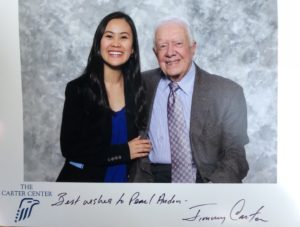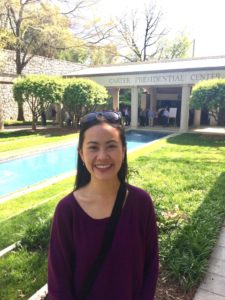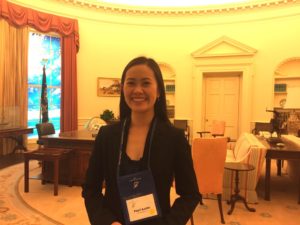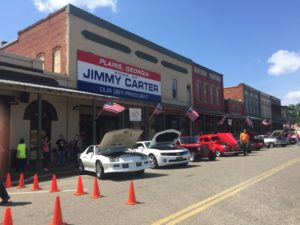This summer, I spent nine weeks in New York City as a marketing intern at a real-estate and technology startup. In the first week of my internship, I feared that I wouldn’t be able to add any value at the company. I had not yet been given much work to do, and I imagined myself having one of those internships you hear about where you just pretend to look busy the whole summer. I soon realized that those fears were unfounded. On the contrary, I was given very significant projects that had a big impact for the company, and I learned a whole lot from each one.
My first major project was to create a calendar system via Calendly for potential clients to sign up for a call with our Client Success team. At first, I thought the task would be a breeze as I had worked with Calendly before and it seemed easy enough. I soon realized the complexity of the task, as I had to integrate multiple members of the teams into one calendar. I also began to encounter some technical issues. Nevertheless, I eventually figured out how to make the system work. My success with this first project gave me confidence that I could troubleshoot when problems arise, and deliver on what was asked of me.
For my second project, I was asked to create and execute an engagement plan, using Textus software, to reach out to over 2,000 users who had signed up for our website in the past month but had not spoken with Client Success nor been assigned to one of the company agents. At the start of the project, I was given very few guidelines, and was uncertain how to proceed. I ultimately learned to reach out for help and ask appropriate questions when necessary. In the end, I was able to present the Marketing team with data demonstrating the success of conducting outreach to previous signups. The company plans to implement this method as part of their Marketing lead generation process.
My largest project of the summer was to perform a social media audit and create a social media strategy for the four social media accounts of the company. The project culminated in a presentation to the leadership of the company. At first I was intimidated by the complexity of the project, and questioned whether I was qualified for the task. I started by conducting research on social media strategy, found and followed directions on how to complete a social media audit, and sought insight from members of the Marketing department. Even though I performed the tasks I believed to be right, I was fearful that the leadership team would be unimpressed with my work or that I would not be able to give them the information they were looking for. I was greatly relieved by the positive feedback I received after my presentation, and I realized that my social media skills really made a difference for the company.
One of the most significant lessons I learned from my internship is what a difference good management makes. The management in the Marketing department made me feel appreciated, supported and valued. As they gained confidence in my work, they gave me increasingly significant projects to perform, which in turn boosted my confidence and helped me do my best work. As my career progresses and I have the opportunity to manage others, I hope to apply the lessons I learned about good management from the Marketing department.

 Before graduating, I had the amazing opportunity to meet former US President Jimmy Carter and attend the 2018 Carter Center Executive Briefing Conference, thanks to the generosity of another Scripps alumna Ms. Barbara Bruner. Founded by Jimmy and Rosalynn Carter in 1982, the
Before graduating, I had the amazing opportunity to meet former US President Jimmy Carter and attend the 2018 Carter Center Executive Briefing Conference, thanks to the generosity of another Scripps alumna Ms. Barbara Bruner. Founded by Jimmy and Rosalynn Carter in 1982, the  The Carter Center Conference began with an evening conversation, “Liberia Looks to the Future”. Experts summarized the Carter Center’s involvement in Liberia’s recent election and its training of a new class of psychologists. I was amazed by the eloquence and political expertise of the speakers as well as the attendees who chimed in during the conversation. It became apparent that most of the conference goers have established careers in government and health. Frankly, it was intimidating. However, I could not miss my chance to ring in on the talk, so I queried about the recent mental health program implemented in Liberia. For my question, I prefaced about my hometown, a community filled with Vietnamese war refugees, and how there was a gap between mental health clinicians/resources and those who needed them. Although it was just one question, this led to follow-up discussions with the attendees throughout the rest of the conference. Most of the people around me were accomplished in their field, but it became less daunting once I put myself there, remained curious, and began to tell my story.
The Carter Center Conference began with an evening conversation, “Liberia Looks to the Future”. Experts summarized the Carter Center’s involvement in Liberia’s recent election and its training of a new class of psychologists. I was amazed by the eloquence and political expertise of the speakers as well as the attendees who chimed in during the conversation. It became apparent that most of the conference goers have established careers in government and health. Frankly, it was intimidating. However, I could not miss my chance to ring in on the talk, so I queried about the recent mental health program implemented in Liberia. For my question, I prefaced about my hometown, a community filled with Vietnamese war refugees, and how there was a gap between mental health clinicians/resources and those who needed them. Although it was just one question, this led to follow-up discussions with the attendees throughout the rest of the conference. Most of the people around me were accomplished in their field, but it became less daunting once I put myself there, remained curious, and began to tell my story. After two sessions discussing diplomacy in the Middle East and eradication of tropical diseases in Sudan, it came time to welcome Mr. President Carter for his talk. When he appeared at the door, I felt my heart palpitate that very instant; absolutely overwhelmed that I could be in the same vicinity with one of the most influential people in the United States. With President Carter now in the room, what did we talk about? In particular, many were wondering about his views on North Korea; hoping he can impart some wisdom. We think about the long-anticipated meeting between current North Korea and US leadership, but Jimmy Carter was actually the first former US President to visit North Korea back in 1994. The talk continued on with some back and forth questions from the audience about the food-shortages and nuclear testing in North Korea. Though the conversation revealed few plausible solutions, having President Carter’s talk be an open discussion on pertinent international relations was a rare opportunity for an undergraduate to participate in.
After two sessions discussing diplomacy in the Middle East and eradication of tropical diseases in Sudan, it came time to welcome Mr. President Carter for his talk. When he appeared at the door, I felt my heart palpitate that very instant; absolutely overwhelmed that I could be in the same vicinity with one of the most influential people in the United States. With President Carter now in the room, what did we talk about? In particular, many were wondering about his views on North Korea; hoping he can impart some wisdom. We think about the long-anticipated meeting between current North Korea and US leadership, but Jimmy Carter was actually the first former US President to visit North Korea back in 1994. The talk continued on with some back and forth questions from the audience about the food-shortages and nuclear testing in North Korea. Though the conversation revealed few plausible solutions, having President Carter’s talk be an open discussion on pertinent international relations was a rare opportunity for an undergraduate to participate in. Three hours south of Atlanta you’ll find Jimmy Carter’s boyhood town of Plains, Georgia. Mr. Carter energetically welcomed us to his high school, childhood ranch, and church. We then enjoyed the city’s offerings of peach cobbler, car show, square dancing, historical monuments, and free peanut treats. Of all the activities in the town, I would highly recommend attending President Carter’s Sunday school at the Maranatha Church. It was a widely anticipated service with us waking up at 5:00 a.m. and standing in pouring rain to get checked by the Secret Service, but it was worth the wait to hear about the city’s faith.
Three hours south of Atlanta you’ll find Jimmy Carter’s boyhood town of Plains, Georgia. Mr. Carter energetically welcomed us to his high school, childhood ranch, and church. We then enjoyed the city’s offerings of peach cobbler, car show, square dancing, historical monuments, and free peanut treats. Of all the activities in the town, I would highly recommend attending President Carter’s Sunday school at the Maranatha Church. It was a widely anticipated service with us waking up at 5:00 a.m. and standing in pouring rain to get checked by the Secret Service, but it was worth the wait to hear about the city’s faith.